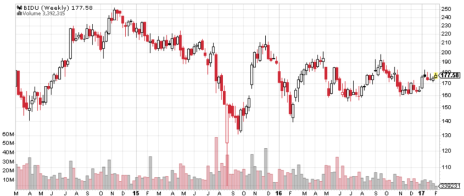Alibaba (BABA) is undoubtedly the most famous Chinese company in the U.S., but Baidu (BIDU), the Google of China, is probably next on the list. Baidu stock was the first Chinese tech stock to make a real name for itself, and it’s still a force to be reckoned with. It’s a big company (market cap is $61.5 billion), the dominant internet search company in China (with about 80% market share), and routinely profitable (its after-tax profit margin in Q3 was 18.9%).
After a massive build-out of its wireless network, China now has more people online than any other country in the world, and they have taken to searching, shopping and messaging on the Internet with real fervor. This means that big online firms enjoy a huge—and growing—user base and the potential revenue growth that comes along with it.
China investors know Baidu, Alibaba and Tencent Holdings (TCEHY) as the BAT stocks, recognizing their preeminent position at the top of China’s internet world.
[text_ad]
Why, then, I’m often asked, have I not had Baidu stock in the Cabot Global Stocks Explorer portfolio since April 2015?
Baidu Stock Consistently Lagging
It’s a very good question, but I have a very good answer. Just look at the chart.
Since BIDU hit its top at 252 back in November 2014, it has built a remarkable chart pattern with four intermediate highs, each lower than the last, and four intermediate lows, each higher than the preceding one.
In technical chart terms, this is a symmetrical triangle, a pattern in which new highs and new lows converge in a tightening trading range. The problem is that it isn’t considered a particularly strong pattern. As our technical bible Technical Analysis of Stock Trends (Edwards and McGee) puts it, “the farther out into the apex of the Triangle prices push without bursting its boundaries, the less force or power the pattern seems to have. … If prices continue to move ‘sidewise’ in narrower and narrower fluctuations … they are quite apt to keep right on to the apex and beyond in a dull drift or ripple which leaves the chart analyst completely at sea.”
That’s not an encouraging observation, but it’s not the whole story with Baidu stock.
In Cabot’s approach to growth investing, the chart is just one of three factors that we take into account. We also require a sound business model (the story) and strong fundamentals (the numbers).
Right now, Baidu’s business model is in flux. While the company still makes good money from selling ads based on web searches, there has been a ton of investment in projects designed to broaden the revenue base. Baidu is making a strong push into artificial intelligence and augmented reality, as shown by the hiring of Microsoft’s Dr. Qi Lu, who was in charge of Microsoft’s R&D, including artificial intelligence and bots.
Also, like most big tech companies, Baidu is also taking a run at the self-driving cars industry and has made alliances to increase its footprint in e-commerce and digital insurance products for Chinese consumers.
The company has also been following the Amazon strategy of plowing free cash flow into research and joint ventures, sacrificing short-term results for longer-term gains. Earnings dipped in 2016 and even revenue declined by 5% in Q3.
But analysts see earnings rising by a healthy 33% in 2017 with revenue jumping from an estimated $10.3 billion in 2016 to $12.3 billion in 2017. When Baidu reports its Q4 results on February 23, analysts are looking for revenue of $2.66 billion and earnings of 90 cents per share. But the real focus will be on the company’s guidance for the first quarter of 2017 and (possibly) for the full year.
Is a BIDU Breakout Coming?
Like good growth investors, we will follow the numbers closely. But what we’re really looking for is a breakout in the chart for BIDU stock, showing that big investors are ready to increase their positions. If BIDU surpasses its September 2016 high close at 195, we will become very interested indeed.
Is Baidu stock inevitable? Well, if the stock market teaches us anything, it’s that nothing is inevitable. But there are few emerging market stocks that hold bigger potential than BIDU, and as Chief Analyst of Cabot Global Stocks Explorer, I will be tracking the stock’s progress with extreme interest. If you’d like to know when I think it’s time to buy Baidu stock, click here to subscribe.
[author_ad]

